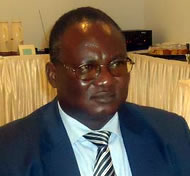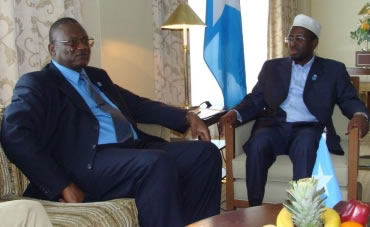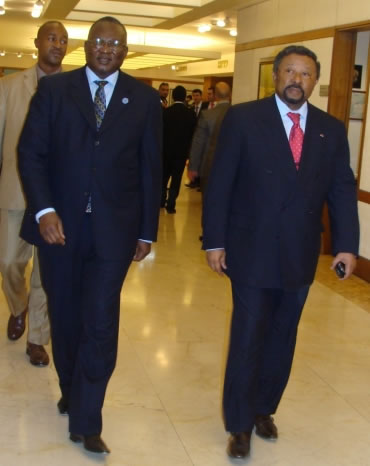With a little more donor support, international forces can help drive al-Shabab out of Mogadishu.


BY AMB. BOUBACAR GAOUSSOU DIARRA
Tuesday, July 26, 2011
In the early hours of a June day, a black Toyota four-by-four tried to run a checkpoint manned by Somali government forces in the capital of Mogadishu. The soldiers opened fire on the vehicle, and a brief firefight ensued; when the dust settled, it soon became clear that the Somali troops had killed Fazul Abdullah Mohammed, who was both a founder of the Somali extremist group al-Shabab and the leader of al Qaeda in Somalia.
This success represents a stark reminder to us all that the African Union's mission in this benighted country is of immediate consequence to the security of the whole world. What's more, it reflects a fundamental, and often overlooked, truth: Slowly but surely, we are bringing security to the Somali people.
For too long, Somalia has been synonymous in the international lexicon with "lost cause." This image, however, is woefully out of date. Recent battlefield successes by joint African Union and Somali government forces have fundamentally changed the picture in Mogadishu. For the first time in two decades, there is now a real opportunity to restore security and calm to the city's long-suffering population. It could quickly unravel, however, unless backers of our efforts step up their support -- and soon.
The African Union Mission in Somalia (AMISOM) has 9,000 troops serving in Mogadishu in support of the Transitional Federal Government of Somalia. Our forces have been deployed in Somalia with support from the United Nations since 2007 -- longer than any other international assistance mission in Somalia. In recent months, these troops have taken much ground from the al Qaeda-linked al-Shabab, which seeks to overthrow the internationally recognized government and impose its radical Islamist ideology on the Somali people.
Our efforts to defeat al-Shabab have gained momentum throughout the past year. In February, Somali government forces supported by AMISOM troops seized control of key positions in northwest Mogadishu, including the former Defense Ministry, which had served as the extremists' main logistical and operational base in the city.

Ambassdor Diarra with Somali President Sheikh Shariff |
In May, AMISOM again supported government forces in an operation to drive al-Shabab out of western Mogadishu by consolidating our hold on Hodan district and squeezing the extremists out of Bakara Market, the city's commercial hub. The operation has already resulted in the capture of the Damanyo Military Camp in the west and Wadnaha Road on the southern fringe of Bakara Market, which had long been closed to civilian traffic by the insurgents.
The impact of these operations cannot be overstated. With the joint force on the verge of securing Bakara Market, we will soon sever this source of illegal revenue for the extremists. Bakara sees sales of millions of dollars per month and therefore represents a major financial stronghold for the insurgents. Once the operation has accomplished its objectives, the roads will be reopened to civilians, increasing the flow of goods and traders to Bakara Market and facilitating the return of some measure of normalcy to many parts of the city.
These gains are part of a steady advance our forces have been making since last summer. At that time, we controlled only a small portion of Mogadishu, situated around the airport and seaport -- journalists regularly referred to the areas under our control as "a few square blocks." We now effectively control two-thirds of the city -- some 16 square miles -- with more than two dozen security outposts scattered throughout the city. More importantly, this has created a relatively safe haven for 80 percent of the estimated 2 million people who live in Mogadishu's southwestern neighborhoods.

Ambassdor Diarra with The Chairperson of the African Union (AU) Commission, Dr. Jean Ping |
Our expanding presence has pushed al-Shabab out of much of Mogadishu. By the end of the summer, 3,000 more AMISOM troops will be joining those already in Somalia, following last year's decision by the U.N. Security Council to authorize an increase in our troop strength. The Somali Army, which is also steadily gaining strength and effectiveness, has also launched an offensive against the militants in the southern regions of the country, forcing the extremists to divert their resources from the city to the hinterland.
As the push to secure Mogadishu continues, AMISOM must prove that it can not only drive out the extremists, but that it can deliver the fruits of peace to the Somali people. To this end, we provide free medical care to more than 12,000 people every month at two AMISOM hospitals in Mogadishu. Our troops also provide over 60,000 liters of safe drinking water per day to civilians living near the AMISOM camps. Admittedly, these efforts aren't nearly enough, but the potential for more humanitarian initiatives -- by both AMISOM and international agencies -- is increasing as more and more territory falls under the authority of the Somali government.
Working with the Somali government, AMISOM will soon take on a number of new projects in Mogadishu. AMISOM will continue to determinedly extend the area that the Somali government controls, enabling other organizations to deliver the emergency aid needed in this time of crisis. Despite AMISOM's limited mandate and resources, we are providing emergency medical assistance to tackle a measles outbreak in a camp of displaced Somalis that has sprung up near the airport. Meanwhile, our police component has established a training program, which has offered instruction to nearly 3,000 Somali police officers, and our political division remains hard at work on training the nascent Somali civil service, and the difficult tasks surrounding the burgeoning peace process.
In the coming months, AMISOM's troop strength will reach 12,000. Burundi and Uganda, currently the mission's main troop contributors, plan to deploy yet more forces. Other African countries, including Nigeria, Guinea, Sierra Leone, and Djibouti have also pledged troops. But this is not enough. We hope the United Nations will in time agree to the African Union's proposal to further expand the AMISOM troop ceiling to 20,000, which our ground commanders say is necessary to drive the extremists out of Somalia.
AMISOM forces, of course, simply could not operate in Somalia without the array of resources of the United Nations and bilateral supporters. The mission, however, is still lacking in a number of areas. We have no combat aircraft; in particular, we need helicopters to support our forces on the ground as they advance. We also need a sophisticated mortar radar system that would help us more accurately target the insurgents, who routinely use innocent Somalis as human shields. Such a system would minimize the risk of inadvertently harming the civilian population. NATO routinely deploys these systems whenever its forces are active in similar theaters, such as Afghanistan.
At some point, we also hope countries with more advanced militaries that support our mission will take it upon themselves to establish a naval blockade and a no-fly zone over Somalia. These requests were contained in the African Union's proposals forwarded to the U.N. Security Council in October 2010, but the council has yet to take a decision on the matter.
Virtually everything we do at AMISOM revolves around donor support. If that support were to stall now, amid our biggest gains to date, the results for Somalia would be disastrous. The extremists, now on the brink of defeat, would regroup and renew their campaign of terror -- not just in Somalia, but as they have shown, across the region and potentially the globe. Somalis in the newly liberated areas of Mogadishu would suffer further from a lack of basic aid. Recurrent challenges, like the ongoing drought, would take an even harsher toll on the country. And the best chance Somalia has had in a generation of stabilizing and building toward a positive future would slip away.
Boubacar Gaoussou Diarra is the special representative of the chairperson of the African Union Commission for Somalia and the head of the African Union Mission in Somalia (AMISOM).